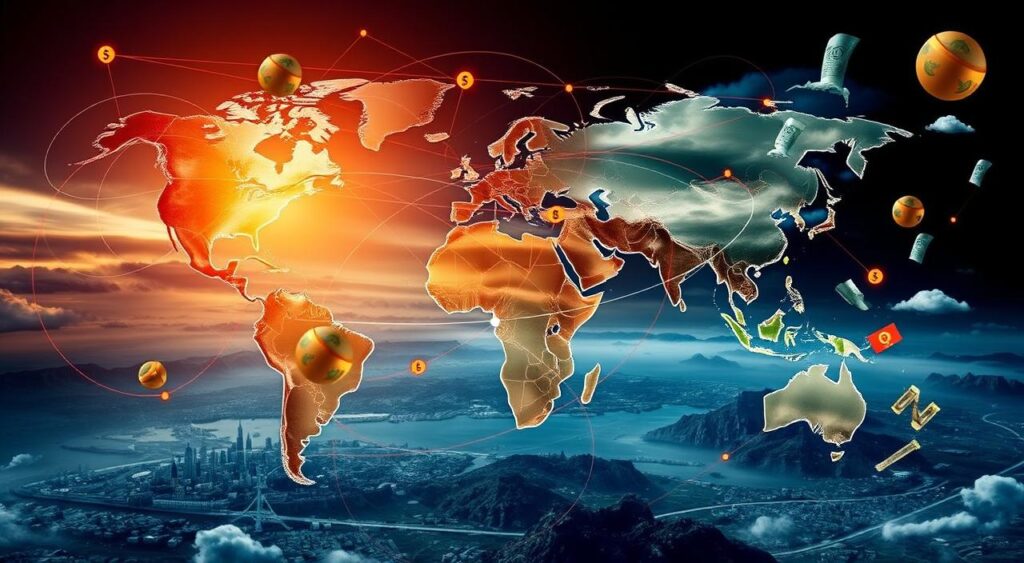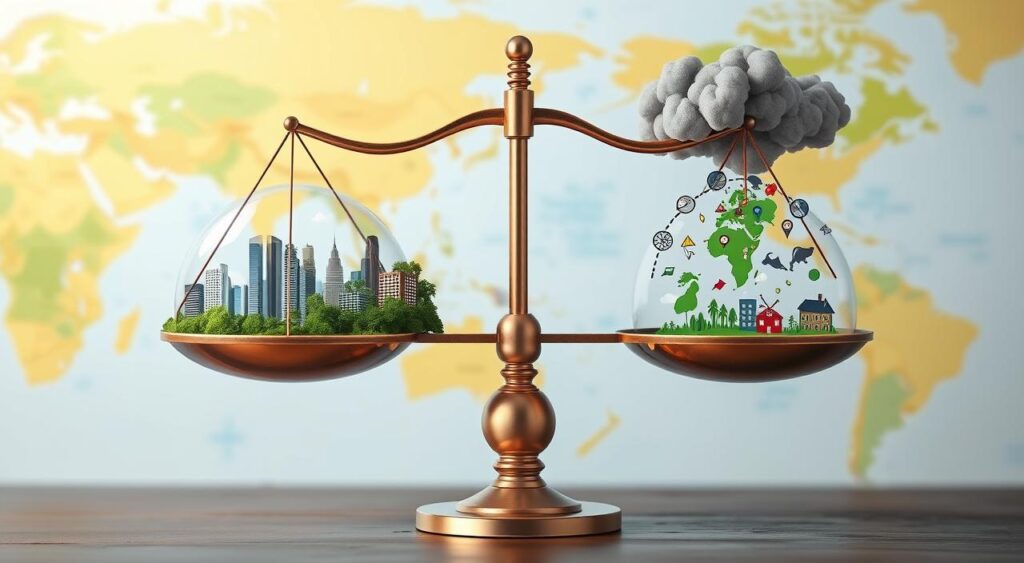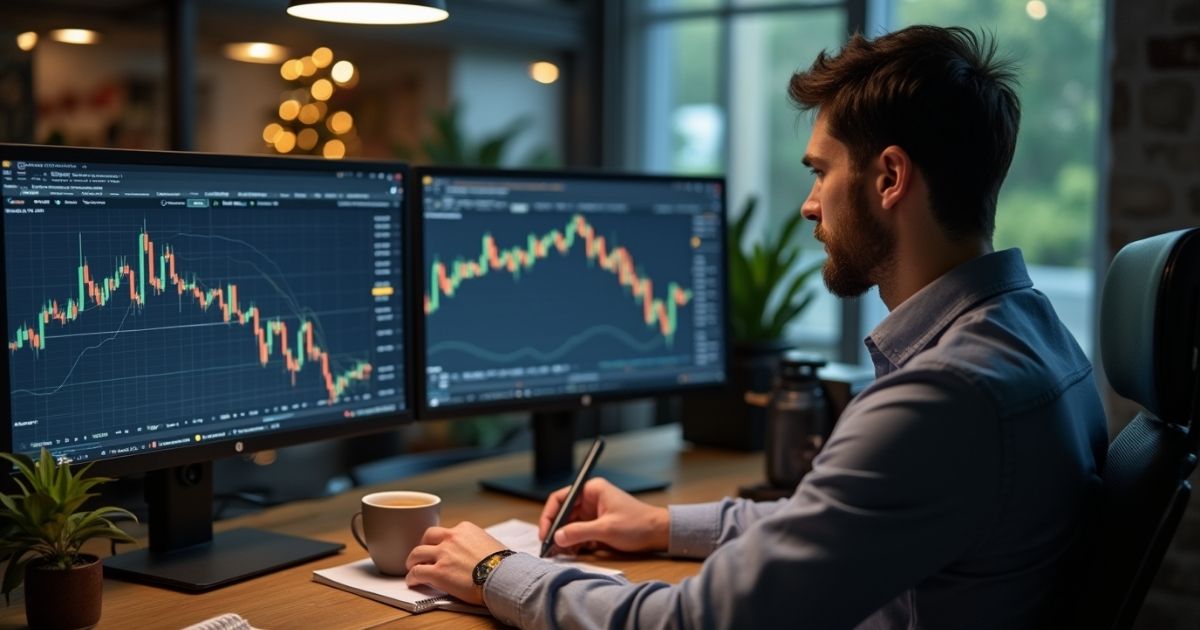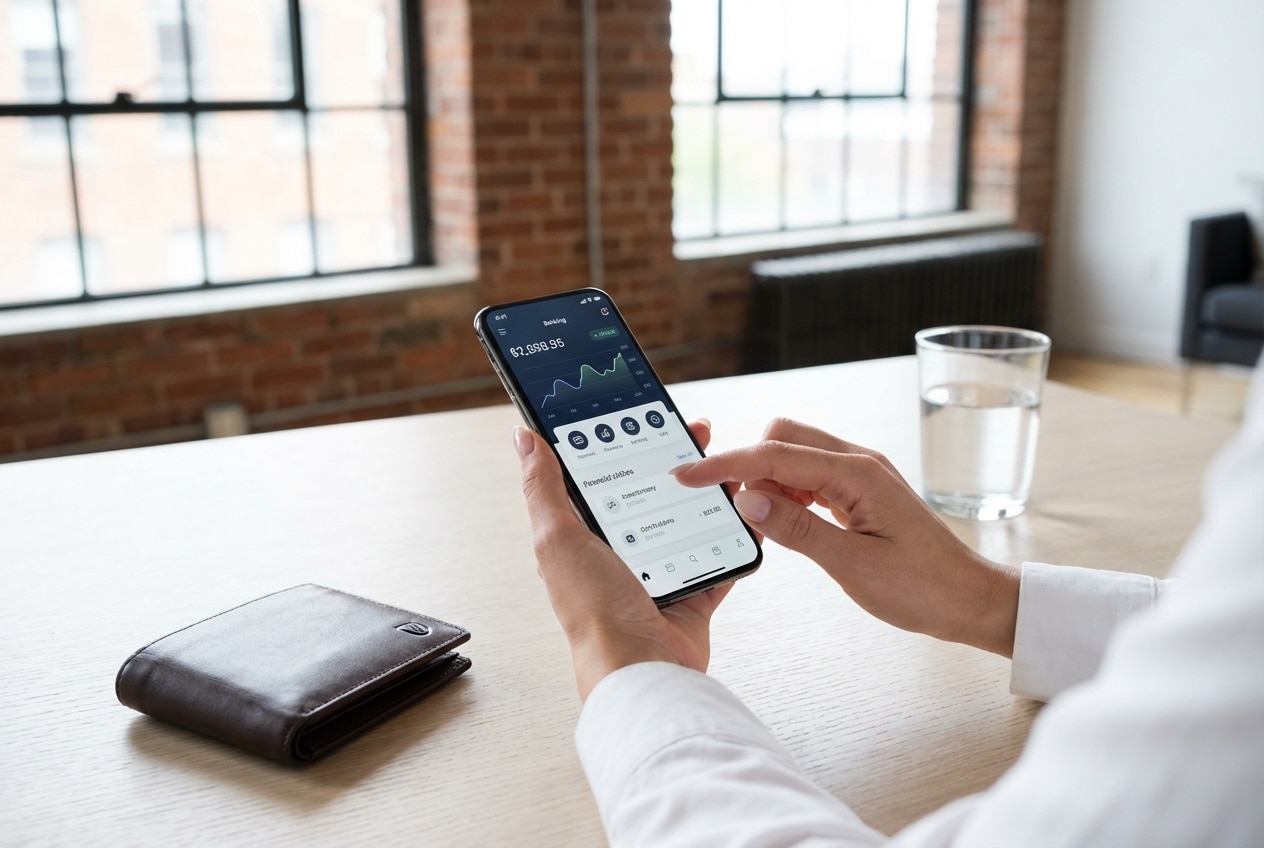Imagine waking up to news of rising political tensions or a sudden military strike. You might feel anxious and unsure, if you’re an investor. Your mind might wonder how these events could affect your money.
These geopolitical shocks can cause short-term market volatility and long-term uncertainty. Understanding economic forecasting and political instability is key in these times.
In 2023, geopolitical events like wars and tensions are a big part of investing. Market declines, averaging 4%, often last about 37 days after such events. Yet, markets can bounce back. U.S. stocks have seen a 5% return six months later and a 9% return after a year.
These statistics show the importance of understanding immediate and long-term effects of geopolitical disruptions. They help in building strong investment strategies and managing risks.
These events affect more than just numbers. They cause real emotional and financial stress. It’s important for investors to grasp the global market trends and the unpredictable nature of political instability.
Key Takeaways
- Geopolitical events can cause immediate market declines, averaging 4% over approximately 37 days.
- U.S. stocks typically recover, showing a 5% total return six months post-event and a 9% return after twelve months.
- Stock market volatility often increases during geopolitical crises, impacting asset prices and currency values.
- Investing in sectors like defense and energy may yield benefits during escalated geopolitical tensions.
- Diversification can mitigate risks associated with political and economic instability.
Understanding Geopolitical Risk in Investments

Geopolitical risk is more than just economic issues. It includes threats from international affairs. Tools like media coverage, volatility, and expert analysis help measure this risk.
Defining Geopolitical Risk
Geopolitical risk is the chance of bad events from political tensions or conflicts. It can affect all investments, causing market ups and downs. Knowing this helps investors spread out their money to avoid big losses.
Measuring Geopolitical Risk
Experts use many ways to analyze geopolitical risk. They look at media trends, asset price swings, and past market reactions. For example, global stocks often move a lot when there’s political tension.
Over 30 years, geopolitical risks have meant lower stock returns and more uncertainty. Some sectors, like defense, are more at risk. But others, like healthcare, are safer.
Historical Examples of Geopolitical Events
Many events show how geopolitical risks affect investments. For example, the Pearl Harbor attack in 1941 caused a big drop in the S&P 500. It took 307 days to get back to normal.
The 9/11 attacks in 2001 also led to a big drop, but the market recovered quickly. Russia’s invasion of Ukraine in 2022 caused a 2.1% drop in the S&P 500. It recovered in just 23 days. Looking at these events helps investors plan better and keep their portfolios stable.
How Geopolitical Events Affect Stock Markets
Geopolitical events greatly influence stock markets worldwide. They can cause market volatility and lead to changes in sectors and factors. Knowing how these events affect markets helps investors manage risks better.
Short-term Market Responses
At first, markets react with panic and uncertainty to geopolitical events. Volatility spikes quickly, with currency markets reacting fast to bad news. For example, oil prices hit over $90/barrel during conflicts, showing the market’s quick response.
Stock markets react differently than currency markets. While currency markets drop fast, stock markets react more balanced. History shows these reactions are stronger during high-risk times, like the 9/11 attacks and the Russia-Ukraine war.
Long-term Market Recoveries
After geopolitical events, markets recover in interesting ways. Equity markets might find a balance point about a month after positive news. But, the market’s response is complex, influenced by many factors.
Geopolitical issues can make companies change their strategies for the better. The GPR shows some sectors decline, while others grow, changing the market over time.
Sector-specific Impacts
Geopolitical events affect different sectors in different ways. The location of operations and reliance on international relations are key. Companies in conflict zones, like the Middle East, face more risks and longer recoveries.
Managing risks is critical, as sectors like defense and energy might see gains. But sectors like manufacturing and tourism, which rely on stable relations, could drop. Factors like trade changes and investment shifts also affect sectors, making strategic portfolio adjustments essential.
Notable Geopolitical Events and Their Market Impacts
History shows that big geopolitical events can really move markets. They change how investors feel and affect the economy. Knowing how these events and market reactions work helps us predict the economy and find good investment chances.
Pearl Harbor Attack
The surprise attack on Pearl Harbor on December 7, 1941, shocked America. It immediately hurt the U.S. stock market. The market fell hard as people worried about the economy’s future.
But, the war effort boosted industry and jobs. This shows how markets can bounce back after big hits.
“34% of investors were potentially worried about geopolitical risks, according to JP Morgan Private Bank’s recent client survey.”
September 11 Attacks
The 9/11 attacks shook the world’s financial markets. The New York Stock Exchange was closed for days. When it reopened, the market fell sharply.
But, it quickly recovered. This shows how markets can bounce back from big shocks. It teaches investors to adjust to new risks.
Russia-Ukraine War
The Russia-Ukraine war has deeply affected markets in Europe and worldwide. The U.S. has given over $55.7 billion in military aid to Ukraine. This shows the long-lasting impact of the war.
European energy security is a big worry. This has made markets unstable and energy prices high. The war shows why we need to keep an eye on the economy to deal with long-term risks.
Looking at these events helps investors understand future market risks. Almost 90% of geopolitical events, says Citigroup Inc.’s Global Wealth Report 2024, don’t change the world economy. This shows markets can be strong despite challenges. To do well in investing, it’s key to keep up with market trends and new investment chances.
Investment Strategies During Geopolitical Uncertainty

When geopolitical tensions rise, investors look for ways to protect their money. They want to avoid big losses and keep their investments stable. There are several strategies that can help with this.
Diversification
Spreading investments across different areas is key. This means putting money in various assets, industries, and places. It helps lessen the blow of any single event.
J.P. Morgan suggests using their Six Circles Funds. These are managed by others to spread out risks well.
Maintaining a Long-term Focus
Investors should keep their eyes on the long game, even when markets are shaky. History shows that markets usually bounce back after a crisis. This makes sticking to a long-term plan very important.
It’s also vital to understand the risks, goals, and costs of investments. This helps keep portfolios growing even when things are unstable.
Adjusting Asset Allocation
Changing how investments are spread out is wise when global tensions rise. For example, moving money to sectors not as affected by global trade can be safer. This could be things like utilities or healthcare.
J.P. Morgan’s advice is to always check and tweak investment mixes. This keeps them in line with current risks and goals.
In summary, smart investment plans are all about diversifying, focusing long-term, and adjusting as needed. While no plan can remove all risks, making informed choices can help investors handle market ups and downs better.
Markets to Watch Based on Global Events
Watching markets sensitive to global events helps investors understand risks and find new chances. It’s about looking at global trends and how events affect different investments. This includes stocks, commodities, currencies, and indexes.
The S&P 500 jumped 27.6% from October 27 to March 28. This shows how big of an impact global events can have on markets. Most years see more than three big drops, making a solid investment plan key.
In 2024, people will vote in elections in markets covering about 54% of the world’s population and nearly 60% of its GDP. Investors expect policy rates to be over 4% in 2029, showing strong growth hopes. But, high fiscal deficits are likely to keep going due to higher interest costs and policy shifts.
It’s vital to use a smart approach to markets to watch. The Atlanta Fed’s GDP Now estimates first-quarter growth at 2.9%. Long-term rates are rising, with policy rates expected to stay around 2.5-2.75% long-term. This means investors are ready for steady economic growth.
Investment plans must also think about higher fiscal deficits. These are expected to keep going, even after elections, because of higher interest costs and policy changes. For example, President Trump wants to keep all tax cuts, leading to more deficits. Biden might raise corporate taxes instead.
The role of maritime routes in global trade is also key. With 90% of global goods trade on these routes, companies must think about ocean politics in their plans. The Geostrategic Business Group also highlights AI and ocean geopolitics as major trends for 2024, affecting businesses worldwide.
By keeping an eye on global markets, investors can handle the challenges and seize the chances brought by changing global politics.
Geopolitical Risk Analysis for Investors
For investors, grasping geopolitical risk analysis is key. It involves both numbers and expert opinions. This mix helps investors understand how global events might affect their money.
Quantitative Measures
Numbers are a big part of political risk assessment. They use financial models to track global mentions and market swings. Caldara and Iacoviello found a way to measure geopolitical risk from 1985 on.
They showed that big changes in global risks can hurt investments for months. This knowledge helps investors make better choices.
Qualitative Assessments
Expert opinions are also vital. They look at world events, country reports, and economic forecasts. These insights help businesses plan better for global risks.
For example, experts can turn their views into numbers. This makes it easier to act on that information.
Combining Multiple Approaches
Mixing numbers and expert views gives a full picture of risks. This way, investors can better predict and handle global risks. It helps them see both short and long-term risks to their money.
Tools like benchmarking and econometric models help gather all this data. This gives a complete view of the situation. Nations that work together often face fewer risks, showing the value of global cooperation.
Scenario analysis also plays a big role. It lets investors see how different scenarios might affect their money. Early signs help investors adjust quickly to protect their investments. This way, they can make their money plans work better, even with global uncertainties.
Mitigating Geopolitical Investment Risks

In today’s global economy, it’s key to manage geopolitical risks. These risks can cause big market swings. By using smart strategies, investors can protect themselves from financial shocks.
The Geopolitical Risk (GPR) index shows how likely or intense negative events are. Studies show that after a big geopolitical shock, inflation goes up by 0.1% and industrial production drops by 0.15% six months later. This highlights the need for early protective measures.
To tackle geopolitical risks, investors can try these:
- Spread out investments across different sectors and places. This helps reduce the effect of local troubles.
- Invest in safe assets like gold, Swiss francs, and US Treasuries. They tend to stay stable during crises.
- Keep enough cash on hand to handle sudden market changes. This helps investors stay afloat during uncertain times.
Geopolitical events can have a big but short-term impact on markets. For example, the EURO STOXX 50 index might drop by 1% due to a shock. At the same time, the VSTOXX might jump by 1.5 points, showing more uncertainty. Also, risky assets might see their yields go up, while safe ones like German bonds might see theirs go down.
Investment funds hold over €8 trillion in stocks and bonds, with about 10% in vulnerable sectors. Knowing which sectors are at risk is key. For instance, transport and aircraft are more vulnerable than mining or consumer goods.
Investors should plan ahead, expecting changes in geopolitics. Focusing on sectors that might do well in crises, like fossil fuels, can also help. This way, they can better handle unexpected market shifts.
In short, understanding conflicts, market trends, and sector risks is vital. By diversifying, investing wisely, keeping cash ready, and using hedge funds, investors can shield themselves from geopolitical shocks.
Opportunities Arising from Geopolitical Events
Geopolitical events greatly affect financial markets, creating chances for smart investors. Knowing how to spot investment opportunities during political helps reduce risks. It also opens doors to growth areas.
Investing in Defense Stocks
When there are conflicts, defense spending goes up, making defense stocks attractive. Morningstar Direct reports show almost $3 billion went into aerospace and defense funds from February to April 2022. This was after Russia invaded Ukraine. Investing in these sectors can be a smart move, even when things are uncertain.
Commodities as Safe Havens
Investing in commodities is wise when tensions rise. As geopolitical risk increases, so do oil prices. This shows commodities can be a safe place for investors. Adding them to a diversified portfolio can protect against inflation and market ups and downs.
Geographical Diversification
Spreading investments across different regions is key during high geopolitical risk. A well-diversified portfolio can shield against political instability in one area. For instance, funds focused on emerging markets, excluding China, grew from eight to 20 by early 2022. They saw almost $1 billion in inflows each month in 2024. This diversification helps keep the portfolio stable.
The global economy might face higher inflation, slower growth, and big welfare losses during tensions. But, by tapping into investment chances in defense stocks, commodities, or spreading investments geographically, investors can better handle market challenges.
Real-life Case Studies of Geopolitical Impact
Looking at geopolitical investment case analyses through detailed case studies gives us valuable insights. For example, the U.S.-China trade war had a big impact on the tech and manufacturing sectors. This caused a lot of market volatility.
Companies like Apple and Tesla saw their stock prices go up and down. This was because of tariffs and trade restrictions that changed their costs and supply chains.
Historical data shows Brexit had a big impact on investments. The uncertainty about the British pound and EU trade unsettled markets. Financial indices showed how worried investors were about future trade and economic stability.
Defense and cybersecurity companies often do well during conflicts. For example, when tensions rise, like in the Russia-Ukraine war, companies like Lockheed Martin and Raytheon Technologies benefit. But, tourism and transportation sectors suffer, with stocks falling due to security concerns and travel bans.
Currency markets are very sensitive to global events. The U.S. dollar index (USDX) changes value in response to global unrest. This affects the value of different currencies. Also, commodity prices get disrupted. For example, the Palestine-Israel conflict can make gold prices go up as investors look for safe assets.
Case studies show the real-life effects of geopolitical events. The MSCI World Small Cap Index, covering about 14% of the free float-adjusted market capitalization across 23 Developed Markets, shows how geopolitical activities can lower investor confidence. This affects stock returns.
North Korea’s missile tests and military confrontations are a clear example of a severe geopolitical investment case analysis. The Hwasong-15 missile test in 2017, which could reach the U.S., raised global concerns. This led to lower stock returns, mainly for companies with a lot of domestic investor shares and significant fixed assets.
Diversification is key to dealing with the effects of geopolitical events. The MSCI World Small Cap Index, with about 4,130 constituents, shows how spreading investments can reduce volatility. Safe-haven assets like gold, government bonds, and precious metals tend to do well during these times.
Overall, these case studies give us a detailed look at how geopolitical events affect investments. They highlight the importance of understanding geopolitical risks when making investment decisions.
Impact of Geopolitical Events on Investments

Geopolitical events have a big impact on investments. They change how markets behave and what investors do. Looking at how these events compare to market uncertainty, like the VIX Index, gives us more insight.
Geopolitical Events vs. Market-based Measures of Uncertainty
Geopolitical events can make markets very uncertain. For example, the Pearl Harbor attack in 1941 caused a big drop in the S&P 500. It fell by -3.8% in one day and took 143 days to get back to where it was.
The September 11 attacks also had a big impact. The S&P 500 fell by -4.9% in one day. But it recovered in just 11 days. Modern conflicts, like the Russia-Ukraine War in 2022, also caused a drop in the market. The S&P 500 fell by -2.1% in one day and recovered in 13 days.
Equity Returns in High vs. Low Geopolitical Risk Periods
Looking at equity returns during high and low risk periods shows big differences. High-risk periods often see bigger drops and longer recoveries. For example, President John F. Kennedy’s assassination in 1963 caused a small drop in the market. But it recovered in just one day.
On the other hand, the Iraq invasion of Kuwait in 1990 caused a bigger drop. The S&P 500 fell by -1.1% in one day. It took 71 days to recover from the -16.9% drop.
Sector and Factor Variations
Different sectors and factors react differently to geopolitical risk. For example, the COVID-19 pandemic disrupted global supply chains. This hit sectors like technology and manufacturing hard.
Geopolitical tensions in the Middle East can also affect oil prices. This impacts investments in the energy sector. Trade wars, like the US-China dispute, disrupt global supply chains. This affects corporate earnings and the stock market.
During these times, strategic asset management is key. Investors need to adjust their portfolios to deal with uncertainty. The analysis of equity markets during these times shows the importance of diversified and well-thought-out investment strategies.
Learn more about how geopolitical shocks impact.
Conclusion
Geopolitical events shape the global investment scene, making it vital to adjust strategies. Past crises, like the Russia-Ukraine war, show how markets can swing wildly. Defense and energy stocks often soar when military spending or oil tensions rise.
In China, a study used a special model to see how geopolitical risks affect investments. It found that at first, risks made investors more cautious. But after 2015, this changed, showing how managers adapt to new risks. For more details, check out the full study.
Looking ahead, keeping up with global events and spreading investments across different areas is key. Adding safe assets like government bonds or gold can help protect against big drops. Also, using options or inverse ETFs can help hedge against losses.
Investing with a long-term view, while watching global events closely, is critical. This approach helps manage risks and seize new chances. By being smart and flexible, investors can navigate market ups and downs effectively.
FAQ
What is the impact of geopolitical events on investments?
Geopolitical events can shake up investments by causing market ups and downs. Knowing how these events affect markets helps in making smart investment plans and managing risks well.
How can geopolitical risks be measured?
Geopolitical risks can be measured in a few ways. We can use numbers like volatility and how often media talks about it. We also look at expert opinions on the political scene.
Can you provide examples of historical geopolitical events that affected markets?
Yes, there are many examples. The Pearl Harbor attack, the September 11 attacks, and the Russia-Ukraine War all had big effects on markets worldwide.
How do stock markets typically respond to short-term geopolitical events?
Stock markets often see panic and uncertainty in the short term, leading to drops. But, how they react can vary a lot, depending on the event’s nature and how severe it seems.
What are long-term recovery patterns after geopolitical disruptions?
After geopolitical events, long-term recoveries happen through strategic changes. Companies and economies adjust, and markets rebalance as they adapt to the new situation.
Why do different sectors respond differently to geopolitical events?
Different sectors face different impacts because of where they operate, their industry, and how they rely on global relations. Some sectors might bounce back faster, while others could face more challenges.
What strategies can investors use during geopolitical uncertainty?
Investors can spread out their investments, keep a long-term view, and adjust their mix of assets to lessen risks. Focusing on sectors less tied to global trade can also be helpful.
How can investors determine which markets to watch during global events?
Investors should look at global trends, think about how events affect different areas, and watch sectors that are sensitive to changes. This helps spot risks and chances.
What are some real-life case studies of geopolitical impact on investments?
Looking at real cases like the effects of wars, political killings, and terrorism gives us practical lessons. It shows how geopolitical risks can affect investment outcomes.
How can geopolitical investment risks be mitigated?
To lessen geopolitical risks, identify conflicts of interest, understand how companies react, and check how investments perform. Using forward-looking strategies is key.
What opportunities can arise from geopolitical events?
Geopolitical conflicts can boost defense stocks, make certain commodities safe bets, and highlight the value of diversifying by geography. These events can open up unique investment chances.














